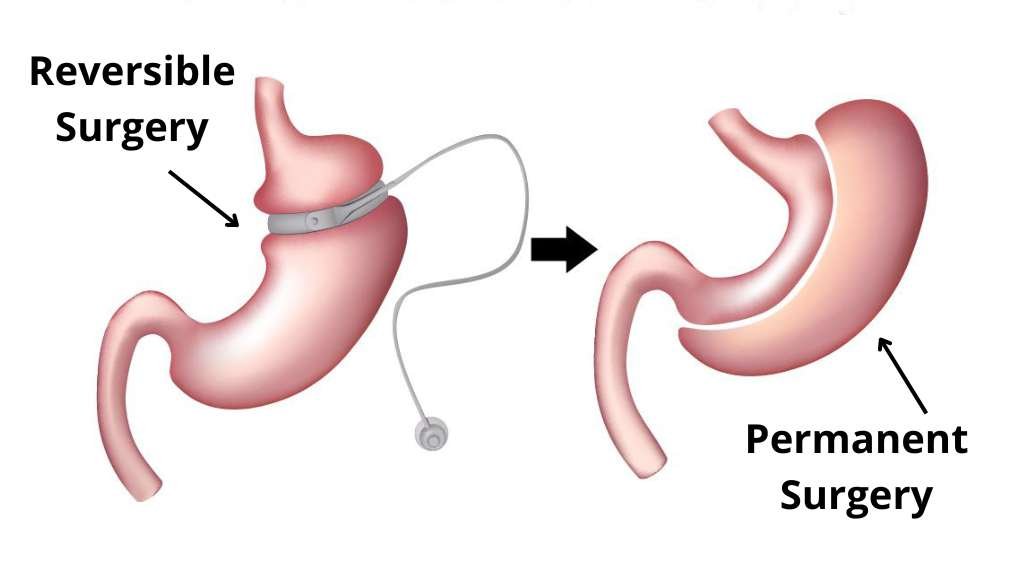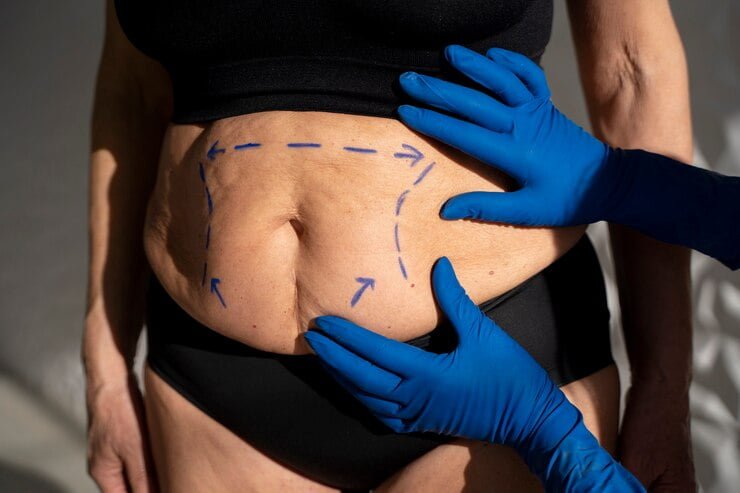Choosing to get weight loss surgery is a decision that requires significant research and patience. Is sleeve gastrectomy, sometimes referred to as reversible gastric sleeve surgery? This is one of the frequently requested queries we get. Let’s examine the long-term effects of this bariatric treatment in detail.
How a Gastric Sleeve Surgery Works
Approximately 75–80% of the stomach is removed during gastric sleeve surgery, commonly referred to as sleeve gastrectomy. This treatment shrinks the stomach permanently, which restricts food intake and encourages weight loss. The stomach is stapled along the length during the gastric sleeve treatment, and the stretchable part is removed through a tiny skin incision. The specimen is taken out, put in a preservation solution, and gave to the pathology lab to be inspected under a microscope a few days afterwards.
It is just not possible to reverse a gastric sleeve due to the complexity of the procedure. Fortunately, this would only be necessary or wanted in a very few extreme cases, even if it were possible.
Can a Gastric Sleeve be reversed?
The quick answer is that most people believe gastric sleeve surgery to be irreversible. In contrast to other operations such as gastric banding, which involve the removal of adjustable bands, gastric sleeve surgery permanently transforms the size and shape of the stomach.
It is impossible to reconstruct or return a surgically excised part of the stomach to its pre-surgery form. The goal of the surgical transformation of the stomach’s structure is to facilitate long-term weight loss and metabolic benefits by making the change permanent.
Typical Reasons for Gastric Sleeve Reversals
The goal of gastric sleeve surgery is to help people lose weight permanently. Reversing the treatment, however, could be a preferable option in some rare circumstances depending on the person’s lifestyle and health.
The following are the most frequent causes of gastric sleeve surgery reversals:
Inadequate Weight Loss Outcomes
Reversing the gastric sleeve treatment may help you achieve better long-term outcomes if your body does not react to it well or if you have gained back some of your initial weight loss following the procedure.
Nutritional Deficits
Because gastric sleeve surgery reduces the synthesis of hormones and digestive enzymes, it might result in vitamin shortages. Reversing the process could be required if these deficits are not controlled by diet and supplements.
Digestive Issues
Following gastric sleeve surgery, some patients may have ongoing nausea, vomiting, and abdominal discomfort. In certain cases, reversing the treatment might help lessen or get rid of these effects.
Medical Complications
The gastric sleeve treatment may not be beneficial in reducing weight if a patient has certain medical issues, such as a liver disorder. In some cases, reversing it might make these situations better.
Pre-Operation Observations for Reversing Gastric Sleeve Surgery
Patients must go through an extensive evaluation with their bariatric surgeon before the surgery. The patient will have imaging scans, blood tests, and meetings with other physicians to make sure they are well enough to undergo surgery.
Before the treatment, patients would also need to change their lifestyle, such as giving up smoking or decreasing their weight. To guarantee a good result, all preoperative recommendations must be followed.
Instructions for Gastric Sleeve Reversal Surgery during the Operation
Depending on the exact process, bariatric reversal surgery might take several hours to complete and is usually done under general anesthesia.
To gain access to the stomach and small intestine, the surgeon will create tiny incisions in the abdominal region. The stitches or surgical staples are used to seal the incisions during bariatric surgery adjustment or reversal.
Following the operation, patients might have to spend a few days in the hospital. During this period, they will get instructions for post-operative care and be closely monitored for problems.
Recovery and Post-Operation Care
After surgery, recovery time might differ from patient to patient. Patients are required to follow to a rigid exercise and nutrition regimen and schedule follow-up visits with their bariatric surgeon on a frequent basis.
Following to the suggested food requirements and gradually increasing physical activity levels under a doctor’s supervision are important. This allows for a speedy recovery and durable outcomes.
Development in Gastric Sleeve Reversal Methods
The process of reverse weight-loss surgery has improved. Laparoscopic surgery, often known as minimally invasive procedures, involves making tiny incisions and using specialized instruments. This shortens the healing period and reduces scarring.
Endoscopic reversal is an additional innovative approach that involves passing a flexible tube through the mouth and into the stomach and containing a camera. This technique accelerates healing and reduces scarring. Surgery is now quicker, safer, and less painful for patients thanks to these advancements.
Gastric sleeve surgery is a permanent and typically irreversible treatment that alters the size and function of the stomach. While it provides significant weight loss and health advantages, anyone thinking about this surgery should recognize that it is irreversible and be totally committed to lifelong changes to their diet and lifestyle.
TurkeyObesity is devoted to providing complete information and assistance to anyone considering weight loss surgery. Contact us to schedule a consultation to discuss gastric sleeve surgery and other treatment options that are suited to your unique requirements and health objectives. We are here to support you on your path to a better, happier life.
Frequently Asked Questions (FAQs)
- How long should I wait before considering bariatric reversal surgery?It is advisable you should wait 12-18 months following your original bariatric treatment before considering a reversal.
- Can a gastric bypass be reversed, and how does it happen?Yes, gastric bypass surgery can be reversed through a method known as gastric bypass reversal.
- What should patients understand about the reversibility of gastric banding?While gastric banding is reversible, it may not always be the most effective long-term weight loss strategy. Before undergoing first surgery, consult with a bariatric specialist about available alternatives. This can help avoid the need for reversal.













